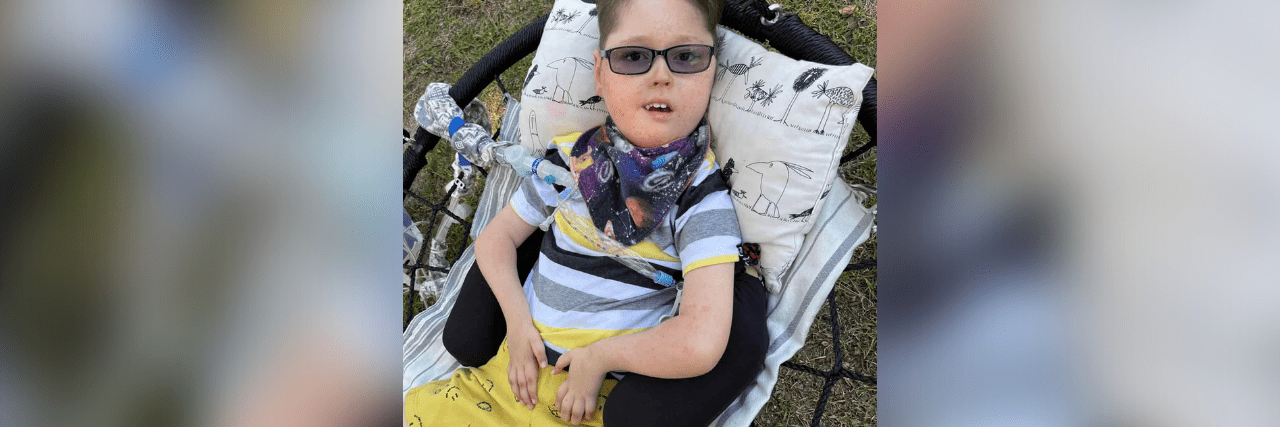“I know it’s hard.”
I’ve heard that before and again recently the other day in regards to my son. Or my life or life with my son, I guess. I feel like I’ve been far too busy gaslighting myself into being strong that I sometimes forget that day by day, I’m living in an unimaginably hard situation.
For context, my son is almost 9 years old and lives with a severe disorder called spinal muscular atrophy type 1.
Here are some hard things I’ve found to be true:
It’s hard knowing that he’ll die some day. Probably before me. That’s what they told me when he was a baby. “Take him home and love him because you won’t have much time.” We did and have been loving him so much for the last nine years. Far exceeding the life expectancy he was given. As time goes on we fear when the day will actually come. A looming dread that always sits in the back of my mind. It’s creeps to the front when I watch my friends’ grieve the loss of their babies. Their babies that are just like mine. I can only imagine and I do imagine. I imagine that day— when it will come and how it will go. How I could possibly bear to go on living without him?
It’s hard to imagine a world with him and not me as well. While he has other caregivers, no one can quite compare to me. As his mother I know I’m the most equipped. I know him in ways that can’t be explained. How will anyone know such tiny details that I store inside my brain? I swear one day I’ll write them all down but what if that day doesn’t come before I meet my demise?
It’s hard seeing other kids. Not only typical kids but particularly boys around my sons age. Especially the ones who got treatment prior to my son who now can function a little easier in this world. My son wasn’t eligible to enter the trial where these babies were getting life-altering medicine early on because the battle to get the doctors to listen to me and diagnose him took too long. It took until he got deathly ill to the point of being hospitalized for months and permanently attached to a ventilator. This in turn made him ineligible for treatment prior FDA approval. The FDA approval didn’t come until years later making it less effective for him.
It’s hard when we go places and kids point, stare or say obnoxious things. Or worse when the parents do. When the adults don’t correct the situation, but instead quickly rush the children away in embarrassment and ignorance.
It’s hard going places that have failed to consider not all people can walk or fit in small spaces.
It’s hard advocating for your medically complex child when the list of needs is so long. They deserve the best and yet at the end of the day so many boxes go unchecked as you attempt to navigate a broken system.
It’s hard that despite the law, children like mine are indeed left behind and unaccommodated while they fight for their most basic needs to be met.
It’s hard that his brain works but his voice doesn’t so he has to use a computer to talk or rely on nonverbal cues only few can recognize. It’s hard when the computer doesn’t work or he can’t find the words to express what he’s wanting to say. I wish I could see inside of his mind to better understand what he wants and needs.
It’s hard to go about our life as normal after almost losing him. We’ve almost lost him more times than I can count. I’ve watched the color drain from his face and his lips turn blue. I’ve watched his heart rate and oxygen saturation plummet so low I didn’t know if they would come back up.
It’s hard buying baby food at the store. It’s labeled for sitters, a milestone my son never got to. And when the cashier asks “how old is the baby?” and you answer not in months but in years. Then feel the need to explain that he doesn’t eat by mouth but rather a feeding tube because the stranger thinks he’s a bit too old for such food.
It’s hard to expect people to understand you or your life when they couldn’t fathom walking a day in your shoes. “I don’t know how you do it,” they say. With any luck they will never have to know. It’s not a life you willing choose but one that is abruptly assigned to you.
It’s hard to live with chronic post-traumatic stress disorder. They say your trauma can make you stronger but really my trauma has made me traumatized. It’s made me weak, given me sleepless nights and memory loss. It’s made me feel feelings I wish I never had. After developing some interesting coping skills I’ve made myself stronger and dragged myself out of the darkest of places.
I know it’s hard. It’s hard to see and watch and hard to understand or fathom. It’s hard that there’s nothing you can really do to help someone in such a situation because no amount of “I’m sorry” will change the reality of what is. Because it is what it is and it’s not fair.
But for us at this point, it’s probably the most hard to dwell in the negative when we know how incredibly short and fragile this life is. It’s hard to see his smile and smile back. It’s hard to look in his eyes and not want to give him the world. It’s hard not to see the beauty of each and every moment we have together.

